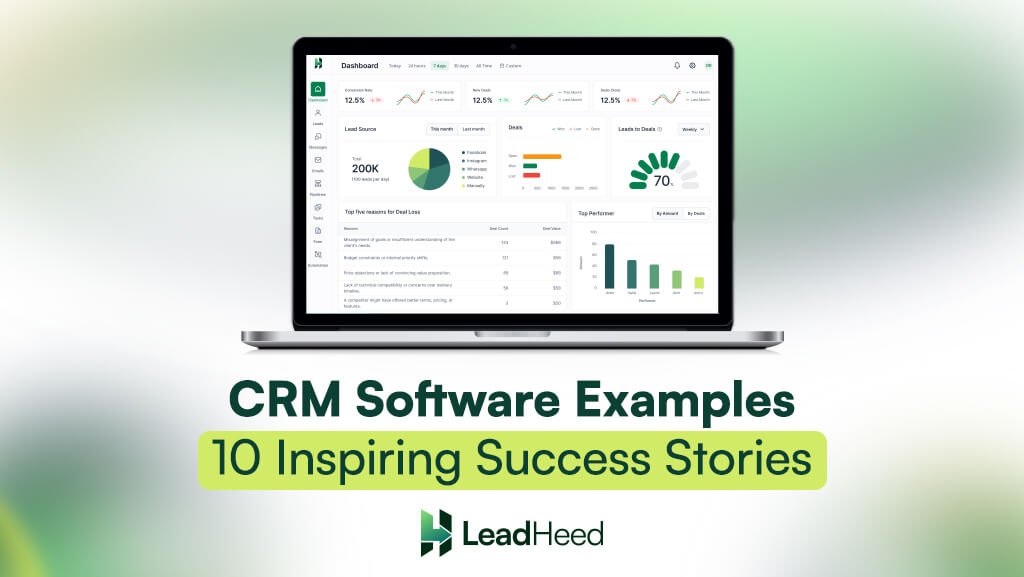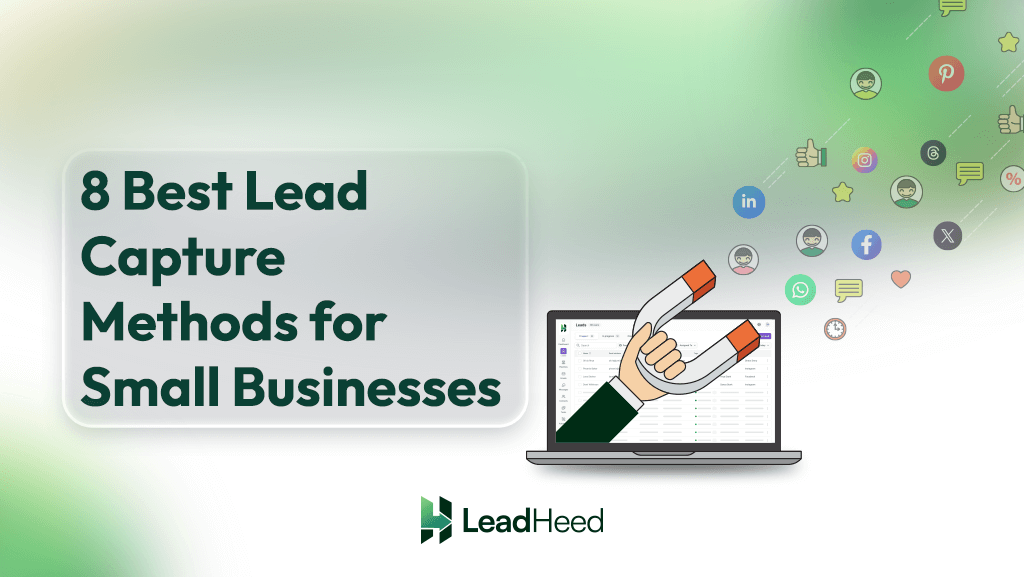Choosing the right CRM for your business is tough, and figuring out where to host is now a whole other challenge. Picking the wrong CRM hosting can lead to unnecessary problems like slow performance, security risks, high costs, and frustrated teams. The worst part is that it could even slow your business growth.
It’s not just about selecting any hosting; it’s a matter of choosing the right one that will be perfect for your business today and tomorrow. With multiple choices like cloud, on-premises, private, and hybrid options, it’s easy to get lost.
But don’t worry. We are here to guide you. In this blog, we will explore what CRM is, see the options, and help you choose the best one to power your business.
What is CRM Hosting?
CRM hosting is simply where your CRM software is stored and where it runs from. CRM helps you manage customer information, track sales, process leads, and improve relationships. But to function properly, a CRM system needs a place to stay, which is basically provided through hosting.
CRM hosting makes sure that all that information and data are being safely stored and are accessible easily whenever you require it. It also ensures that your CRM system runs smoothly without issues, loads quickly, and stays online with no problems.
Hosting can be done in multiple ways. Some CRM software is stored on your own computers and servers. At the same time, some are loaded onto the internet and can be accessed from anywhere with internet access. Wherever it’s hosted, the main job of CRM is to ensure that your CRM runs safely and smoothly.
Good CRM hosting also includes features like regular backups, anti-hacking, and technical support in case of any problems. In simple words, CRM hosting is the solid, behind-the-scenes support that keeps your CRM system running, up, and ready to help your business grow.
What are the types of CRM hosting?
CRM hosting comes in different types, depending on where the CRM is stored and how you access it. The main types of CRM hosting are cloud-based, on-premise, private, and hybrid. Cloud CRM is hosted online by the provider, on-premise CRM is hosted on your company’s servers, private CRM is the same as cloud CRM with more security, and hybrid CRM combines both. Each offers different levels of cost, control, and scalability.
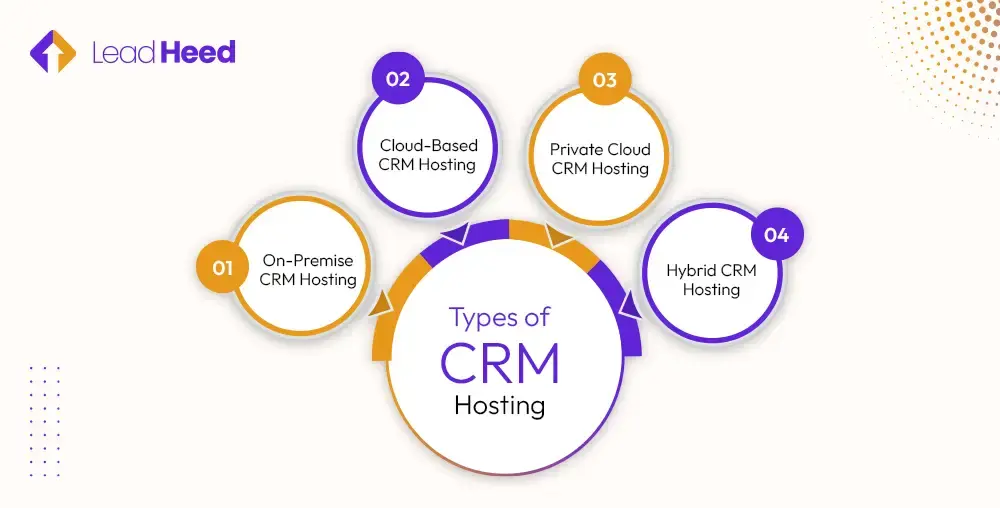
1. On-Premise CRM Hosting
On-premise CRM hosting is when the CRM software is installed directly on your own company’s servers or computers. You are entirely responsible for securing, updating, and managing it. It gives you more control over your data and systems, but it needs a good IT team to look after it. It is more costly at the initial stage because you have to buy hardware and set up the system.
2. Cloud-Based CRM Hosting (SaaS CRM)
Cloud-based CRM, popularly known as SaaS (Software as a Service) CRM, is hosted on the internet. You do not need to install anything. Just log in and access it from anywhere. The CRM vendor manages updates, security, and backups. It is a suitable option for businesses that want a trouble-free, low-budget solution without the hassle of taking care of the system themselves.
3. Private Cloud CRM Hosting
Private cloud hosting gives you the benefits of the cloud with more security. Instead of sharing server space with others (like in regular cloud hosting), you have your own personal server. This is perfect for businesses that need more privacy, extra security, or personalized customization while still wanting remote access.
4. Hybrid CRM Hosting
Hybrid CRM hosting is a mix of both on-premise and cloud hosting. Some of your CRM system is housed on your own servers, while other parts are hosted in the cloud. This offers flexibility, allowing companies to keep sensitive data in-house while still benefiting from the convenience of cloud services.
On-Premise Vs. Cloud-Based CRM Hosting
On-premise CRM hosting and cloud-based CRM hosting are the 2 popular types of hosting mostly used by businesses. Let’s compare these two in detail in a table below:
| Feature | On-Premise CRM Hosting | Cloud-Based CRM Hosting (SaaS) |
| Where it stored | The CRM system is installed and stored on your company’s own servers or computers. | The CRM is hosted online by a provider and accessed through a web browser and the internet. |
| Setup cost | It usually has a high upfront cost. You need to buy servers, software licenses, and setup. | It has a low starting cost. You pay a monthly or yearly fee to use the service. |
| Maintenance | Your business is responsible for all maintenance, including updates, backups, and repairs. | The service provider handles all technical maintenance, so you don’t have to. |
| Access | You can only access the CRM from your office or company network unless a special setup is done. | You can log in and use the CRM from anywhere with internet access — office, home, or mobile. |
| IT support needed | Requires a skilled IT team to manage servers, fix issues, and keep everything running. | Minimal IT skills are needed since the provider takes care of the system. |
| Data control | You have full control over where and how your data is stored and managed. | Your data is stored by the provider, and they handle its storage and security. |
| Scalability | Scaling up means buying more servers or upgrading your system, which takes time and money. | Scaling is easy — you can upgrade your plan or add users quickly when needed. |
| Security | You are responsible for putting strong security measures in place. | The provider includes security features like encryption and automatic backups. |
| Updates and upgrades | Updates must be done manually by your IT team. | Updates are automatic and often included at no extra cost. |
| Best suited for | Businesses that need full control and have strong IT resources in place. | Businesses that want an easy, flexible, and affordable solution with little tech hassle. |
Factors to Consider When Choosing CRM Hosting
When choosing CRM hosting, consider security, scalability, customization, cost, and remote access. Pick a secure option to protect customer data, ensure it can grow with your business, allow customization, fit your budget, and be accessible from anywhere.
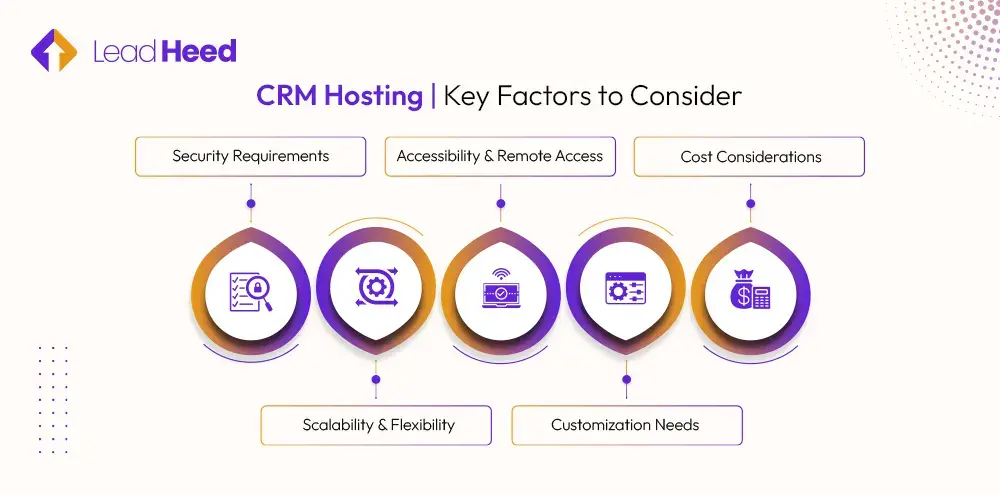
Let’s look at them one by one:
1. Security Requirements
Your CRM is full of sensitive customer information such as their names, emails, phone numbers, and other personal data. You must ensure that the data doesn’t go into the wrong hands. So, make sure you choose such a hosting option that offers strong data security and protection, and also a backup mechanism to protect your valuable information.
2. Scalability and Flexibility
Your company will grow over time, and so will your CRM needs. You might have more employees, customers, or you may need more functionalities. Therefore, choose the host type that can adapt to future growth. It should be capable of expanding the number of users and functionalities easily without starting over.
3. Customization Needs
Most businesses find it satisfactory to change the look or operation of their CRM. If your business also needs a CRM that you can customize or even build to your own way of working, select an option that allows those changes.
4. Cost Considerations
Pricing differs according to the different hosting types. Some may be more expensive to begin with, but may be cheaper in the long term. Some may have basic annual or monthly charges. Think carefully about your finances and what you can put in the short and long term before making the decision.
5. Accessibility and Remote Access
Do you or your employees work from home or travel regularly? Then you’ll need a hosting type where you can access your CRM wherever you are. Make sure it runs well on phones, tablets, and connected computers.
How to Choose the Right CRM Hosting for Your Business?
Choosing the right CRM hosting is an important decision for your business as it can simplify your daily activities, keep your customer data safe and managed, and keep your team on track. So, to pick the best one, you need to analyze a few things. Here is how you can do it in three simple steps:
1. Evaluate Your Business Needs
Before choosing any type of hosting, take time and consider what your business actually needs. Do you have a small team or a large one? Are you a fully on-site business or allow remote work? Do you need basic features, or do you need extensive customization?
Understanding your daily work, team size, and plans for expansion will help you choose a hosting option that works well today and in the future.
2. Questions to Ask a CRM Hosting Provider
Not all CRM hosting providers are the same. So, it’s better to ask a few questions before buying the subscription. Here are a few questions that you can ask:
- How do you protect my data?
- What kind of support do you offer if I have a problem?
- Do you regularly back up our data?
- Can I easily add more users or features as my business grows?
- What are the total costs? Setup, monthly, and hidden fees?
The answers will allow you to compare and pick the right provider.
3. Consult CRM Experts
If you’re unsure about what to choose, it’s a great idea to consult with a CRM expert. Professionals can evaluate your business and guide you to the best form of hosting. Their suggestion can save you mistakes, time, and money.
CRM Hosting Migration: Things to Keep in Mind
Sometimes, there may be a need for businesses to migrate their CRM system from one hosting type to another. For example, from on-premise to cloud, or from one cloud provider to a more appropriate one. This is called CRM hosting migration. While it may sound complex, with the right steps, the migration can be smooth and secure.
Before migrating, plan everything. Start by choosing your new hosting option. Make sure it is more suitable for you than the old one. Having decided on it, determine what data, settings, and features need to be moved. It’s better to define a step-by-step migration plan and assign one person or a team to manage the process.
The following are the main points to keep in mind:
1. Data Backup and Migration Strategies
The most important thing is to back up your data. Before migrating any data, back up all your CRM data, including contacts, deals, tasks, notes, and settings. That way, if something goes wrong, you won’t lose anything.
Then, migrate the data to the new host using a safe and tested process. Most CRM systems offer tools or support for this. If you’re unsure, it’s always best to ask your CRM provider for guidance or hire an expert to assist you.
2. Ensuring Minimal Downtime During Transition
You want your team to keep working with as little interruption as possible. To do this, try to schedule the migration during non-working hours or weekends. Also, test the new system fully before going live. Make sure everything works so your team can pick up right where they left off.
Benefits of choosing a hosted CRM
A hosted CRM is a cloud-based system managed by a provider, so you don’t need to install or maintain anything yourself. It’s easy to use, cost-effective, and accessible from anywhere. Many businesses choose hosted CRMs to save time, reduce IT workload, and scale faster.
Below are some key benefits that make hosted CRM a smart choice for growing businesses.
1. Easy to Set Up and Use
With a hosted CRM, you don’t need a technical setup or complicated software installation. The hosting provider takes care of all that. You simply log in and use it. This setup is best for businesses without an IT department or those who don’t want to worry about dealing with technical things. It also allows your CRM to be ready in a matter of hours.
2. Access from Anywhere, Anytime
Since the CRM is web-based, you are able to use it from any device with an internet connection. Whether you’re in the office, at home, or away from home, you can access it. This is ideal for remote staff or those working out of multiple locations. Everybody is connected, gets updates instantly, and works together easily regardless of location.
3. Lower Costs and No Maintenance Problems
You don’t need to buy servers, install systems, or hire technical experts. Hosted CRMs usually run on a monthly or yearly subscription, which is less expensive. The host does the technical part, so you don’t need to spend additional money on updates, maintenance, or fixing. This also makes it cost-effective for small and new businesses.
4. Frequent Updates and Supportive Help
Hosted CRM providers update the system regularly to add new features, improve performance, and fix bugs. The updates take place automatically without interrupting your team. And if you ever experience a problem, support is just a message or call away. This way, your CRM is always running at peak level, and you always have help whenever you need it.
5. Scales Easily as Your Business Grows
As your company grows or your business matures, a hosted CRM will grow with you. You can increase your users, your storage, or your features without difficulty — without having to start over. This allows you to utilize the same CRM for years to come, refining it as your needs change along the way.
Future of Hosted CRM
The future for hosted CRM is bright and promising. As more businesses are going online and employees prefer to work from home or other remote locations, demand for cloud-based solutions like hosted CRM continues to grow. It keeps team members in contact, enabling them to manage customers better and operate more efficiently, regardless of their location.
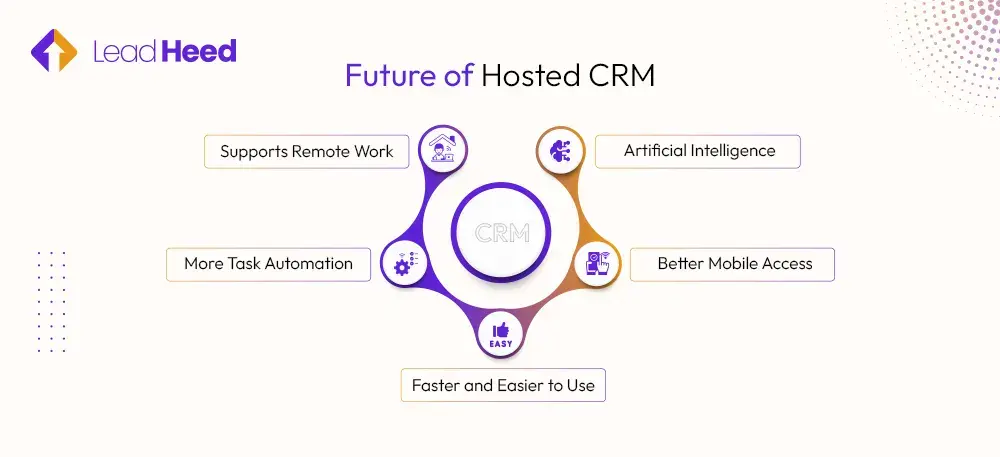
One big trend in the hosted CRM is automation. Increasingly, CRMs will automate tasks such as sending follow-up emails, tracking customer activity, and even suggesting next steps. This will free up time and enable teams to work on more important things.
Another major change is the use of AI (Artificial Intelligence). Hosted CRMs will utilize AI to deliver more intelligent insights, predict customer behavior, and improve decision-making. That means that companies can better understand what their customers require and react faster.
Mobile access is also becoming more prominent. Hosted CRMs will keep on making mobile applications more powerful so that users can manage their work from anywhere. Phone, tablet, or laptop, it will all be at the fingertips of a few taps.
Security and data protection will also become stronger. Since more data is being transmitted online, hosted CRMs will include better security features to safeguard customer data.
Overall, the hosted CRM’s future is to be quicker, more intelligent, and more agile. It will help businesses of all sizes build improved relationships with customers at lower costs in time and money.
Key Features of Self-hosted CRM
Self-hosted CRM systems offer key features such as full control over your data, high customization options, one-time costs with ongoing savings, and offline access. They are the perfect solution for businesses that need more privacy, flexibility, and cost-effectiveness in the long run.
Here are five key features of a self-hosted CRM:
1. Full Control of Your Data
In a self-hosted CRM, all your customer information is stored on your own servers. That means you can entirely control the way you use and store your data. You don’t have to worry about third-party providers handling your private data. It’s ideal for businesses that must comply with strict privacy or regulatory requirements.
2. High Level of Customization
With self-hosted CRMs, you can change or adjust everything to fit your business needs. You can add functions, remove parts you don’t require, and design it to meet your staff’s functions. This provides your CRM with space and lets it evolve as the business’s needs change. You are not limited by the vendor’s restrictions or upgrade timeline.
3. One-time Cost with Ongoing Savings
Most self-hosted CRMs cost you a single purchase compared to a recurring monthly subscription. You pay once and own the software. This will ultimately save you money over time, especially for large teams or businesses with consistent needs. You’ll keep paying for hosting and maintenance, but you don’t have periodic subscription fees.
4. Works Without Internet (Local Access)
Since the CRM is installed on your server, your team will be able to access it through your local network, even when the internet is not available. This ensures business continuity, even in the event of internet downtime or unreliable internet connections. It also proves to be convenient for teams working in secure environments where the web is unavailable.
5. More Control Over Security
Self-hosted CRMs enable you to set up your own security configuration. You can implement firewalls, backups, and password management based on your specifications. This means you can set stronger security rules and provide more protection to customer data. It’s great for industries such as healthcare or banking that require extreme-level data security.
Conclusion
Choosing the right CRM hosting isn’t just a technical decision; it’s a strategic one with immediate impact on your business’s performance, security, and growth. You may choose an on-premise solution for ultimate control, a cloud-based CRM for flexibility, or a hybrid solution for balance, and the key is to match your choice with your business needs, abilities, and long-term goals.
Allow yourself the time to think on your options, ask the right questions, and never hesitate to consult with CRM experts. The right hosting solution will ensure that your CRM is running optimally, your employees are productive, and your customer relationships are further developed.
Frequently Asked Questions (FAQs)
What is a hosted CRM?
A hosted CRM is a customer relationship management system that runs on someone else’s servers instead of your own computer. You can access it through the Internet with a browser or an app.
What are the main types of CRM hosting?
The main types of hosting are on-premise (installed on your own servers), cloud-based (hosted by someone and accessed online), and hybrid (a mix of both).
Which CRM hosting option is the most cost-effective?
Hosted CRM is usually the cheapest. It has a lower setup cost and no in-house servers or IT staff.
What is the future of hosted CRM?
Hosted CRMs are going toward more AI functionality, better data security, and mobile-first design. Cloud CRM will be the future.
What are the examples of hosted CRM?
Examples of hosted CRMs include LeadHeed, Salesforce, HubSpot, Zoho CRM, Pipedrive, and Freshsales. These are cloud-based platforms that you can access through the internet without needing to install anything.

